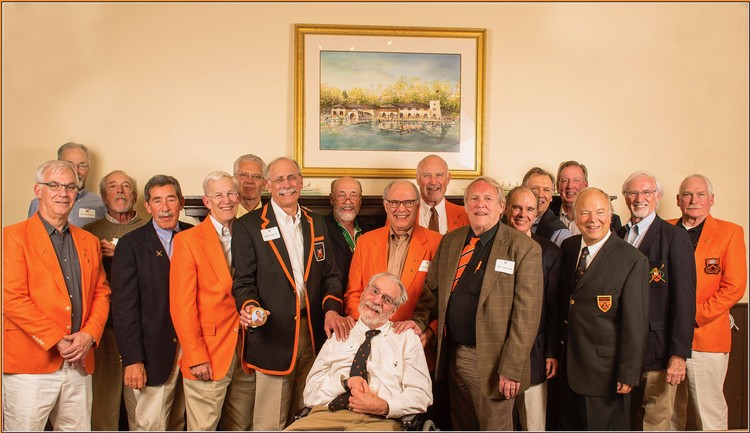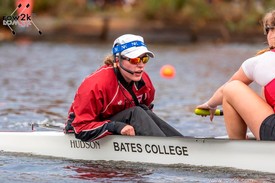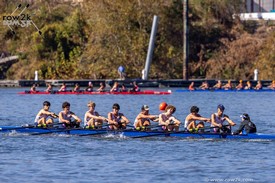Ed Moran, row2k.com

Just after Cornell University won the 1977 IRA heavyweight final on Lake Onondaga in Syracuse, New York, Sports Illustrated writer Dan Levin began a story of the regatta by drawing a comparison between the coaching styles of Cornell's Findley Meislahn and Ted Nash, coach of second place Penn.
Levin noted that after Cornell had defeated Penn the weekend before the championship regatta, Nash had his guys running stadium steps the next morning. Levin wanted to know what Meislahn thought about Nash's approach.
"My guys would never do that," Meislahn told Levin. When Levin apparently suggested that the first-year varsity coach - who was 35 at the time - could just tell them to, Levin wrote Meislahn told him it would have never worked.
"Know how to spell 'fat chance'?" Levin wrote of the exchange. "I'm not Ted Nash, and this isn't Penn. These guys are highly independent. I don't think they need me for very much."
Later in his story, Levin wrote this about Meislahn:
Perhaps more than any other coach at the IRA, Meislahn was a friend - not a wily mentor - to his athletes. His five seniors rowed on the Cornell freshman eight that won the Eastern Sprints and the IRA in 1974, and Meislahn was freshman coach at the time.
He stayed in that job until this year, while his champions went on to row for Varsity Coach Doug Neil. "We rowed for Findley freshman year, got to be good friends, and when he became varsity coach we held on to that," says bow oar Jim Farrell. "He's really sensitive to the psychology of the boat. Penn is coached twice as hard as we are. We haven't worked too hard these last few weeks, and we haven't even run since April."
That Meislahn's coaching style, based more on the connection between himself and his athletes, caught Levin's attention that day did not surprise Princeton University alum Dick Prentke.
.jpg)
Prentke rowed for Meislahn his last two seasons on Princeton's lightweight team, and when he talks about his former coach, one of the key memories of his time under Meislahn was how much his coach cared about his team.
And it was that aspect of Meislahn's personality, his style of interacting with his athletes, that led the two men - and most of the guys that rowed in that Princeton lightweight group - to become life-long friends.
"For the Princeton guys who rowed for Findley, of which I am one, we have stayed together for close to 50 years," Prentke said.
"We have a large group that emails several times a month. And it is mostly a tribute to Findley, that he facilitated these very close friendships. The group that rowed for Findley have been close friends for 50 years, and that was entirely facilitated by the culture established by Findley."
Findley Meislahn died Wednesday. He was 78-years old.
After battling through years of physical difficulties following a massive stroke that struck him during an on-water practice in 1988 - his 12th and final year as Cornell's head heavyweight men's coach - and then a 2017 blood cancer diagnosis, Meislahn caught a cold that developed into to an unbeatable pneumonia.
Born in Brooklyn, New York, Meislahn attended high school at Albany Academy, and attended Princeton University, where he began rowing as a freshman. Following his first year, Meislahn became the stroke of the Princeton heavyweight eight, and eventual team captain.
After finishing his rowing career at Princeton, Meislahn began coaching, and three years after graduating was hired to return to Princeton to coach the men's lightweights. As Prentke remembers, the news that Meislahn was coming back to campus to coach the lightweight squad was not well received.
There was a "divide" between the heavyweight and lightweight crews that had existed for as long as the two squads rowed together on Lake Carnegie, and Meislahn was coming back to Princeton as a standout heavyweight alum.
"Findley would hate anybody saying this," Prentke said, "but he was kind of a rowing god at Princeton. He was the varsity stroke, he was the captain. They had a very solid team, which was hyped to be taller than the basketball team, on average, and heavier than the football team, on average.
"In the fall of 1965, he was brought in to coach the lightweights, which created a minor stir among the team. We were a fairly successful team then, and there was some concern that a heavyweight, especially one of Fin's stature, was taking over the lightweight program when he didn't know anything about lightweights."
Prentke said that Meislahn quickly won over his athletes and not only pulled them together, but was instrumental in bridging the divide in the boathouse.
"He made it very clear through his actions that he was dedicated to the success of our team and to the people on our team," Prentke said. "And this part is actually a very important thing, and it might be the biggest contribution that Findley made to rowing at Princeton, but when Findley arrived he bridged the gap in the boathouse, the Princeton boathouse became a unified boathouse under him."
While Meislahn might have been a unifying coach who befriended his athletes, he did not lack either the intensity or knowledge to coach at the highest levels in collegiate men's rowing, said Yale head coach Steve Gladstone.
Gladstone was the Princeton men's heavyweight coach when Meislahn oversaw the lightweights.
"Fin, first and foremost, really had an excellent understanding of the rowing stroke and how to teach it," Gladstone said. "And he was very, very good. He understood it. That's important, but the other piece was Fin was not a 'march here, march there, do this, do that,' kind of coach. But, he was plenty clear about what needed to be done to go fast," Gladstone said.
"Don't for one second portray Fin as being laid back. Fin was plenty intense. His presentation was modulated, and he had a good sense of humor, but he was very clear. And, he was a good technical coach and knew how to get people on the same page."
Following Princeton, Meislahn went to Cornell to coach the men's freshman team and he remained in that position until 1977 when he became the men's heavyweight coach. During his 12 years there, he led Cornell to three IRA titles.
But his head coaching career ended the day he suffered a stroke while in his launch. The stroke left Meislahn paralyzed on one side and struggling to regain control over his ability to speak effectively.
During those years, Meislahn, who had maintained his physical fitness through a regime of running and rowing on the erg past his college rowing years, continued to exercise as much as he could. And he stayed as close to rowing and coaching as he was physically able.
Dan Roock, now the lightweight men's head coach at Dartmouth, has known Meislahn since he was a high school junior being recruited to row at both Cornell and Princeton. Meislahn wanted Roock to row at Cornell, but he instead decided to row at Princeton.
The two became friends when Roock began a career in coaching, which also led him to Cornell during the years following Meislahn's stroke. "I've known of Fin since I was a teenager. My high school coach was a Cornell guy and I got to know of Fin through my coach."
.jpg)
Following his time as a Princeton undergrad and during his early career in coaching, Roock and Meislahn became friends and stayed close during and after the years Meislahn was dealing with the effects of his stroke.
Roock said Meislahn would come to the boathouse and workout on an erg using the side of his body that still functioned. "He trained hard to keep himself healthy and mobile as much as he could," Roock said.
Meislahn also filled his time accompanying other coaches during practice whenever he could, bringing experience, expertise, and reliable good humor to the proceedings.
"He would come and go out in the launch with me," Roock said. "Even though he wasn't coaching, he retained a good eye for coaching and kept up his interest in it. Fin was the kind of coach who made the sport just better from his involvement in it.
"He had a real passion for rowing and coaching, and he was really good at it," he said. "I really enjoyed the times at Cornell when he would come out in the launch. I had great admiration for this guy who suffered a stroke when he was just in his forties, right at the peak of coaching career or close to it, and just kept on."
Of the people closest to Meislahan, his wife of 35-years, Nancy Hargrave Meislahn, knew best how hard he worked to recover and regain his ability to continue making a contribution to rowing.
"After his stroke in '88 Fin worked hard to achieve what most would call a miraculous recovery. By 1990-92 he was traveling with the Cornell and Penn crews. He was going to practice with lots of coaches who really enjoyed that second set of eyes on the crews, and a sounding board for what is such a lonely coaching profession, with just the coach, the launch and the megaphone," she said.
"His ability to crossover the traditional lines of rivalries was amazing," she said. "I've been on the receiving end of a wave of sadness for our loss, but such wonderful memories and respect. Almost every email from rowers in particular mentions Findley's strength, resilience and positive attitude in face of unusual challenges. To know him was to be inspired, and for me that was every day."
In addition to his wife Nancy, Meislahn is survived by one brother, Harry Meislahn. There are no set plans for funeral services at this time. A celebration of his life and legacy is expected to be held in the future and details will become available then.
The family is encouraging that donations in his memory be made to the National Rowing Foundation.
If you enjoy and rely on row2k, we need your help to be able to keep doing all this. Though row2k sometimes looks like a big, outside-funded operation, it mainly runs on enthusiasm and grit. Help us keep it coming, thank you! Learn more.
Comments | Log in to comment |
- Bont Rowing
- Calm Waters Rowing
- Concept 2
- Craftsbury Sculling
- The Crew Classic
- CrewLAB
- Croker
- Dad Vail Regatta
- Durham Boat Co.
- Empacher
- Faster Masters
- Filippi
- Fluidesign
- h2row.net
- HUDSON
- Live2Row Studios
- Nielsen-Kellerman
- Oak Ridge RA
- Peinert Boat Works
- Pocock Racing Shells
- Race1 USA
- RowKraft
- Rubini Jewelers
- Vespoli USA
- WinTech Racing
- Bont Rowing
- Calm Waters Rowing
- Concept 2
- Craftsbury Sculling
- The Crew Classic
- CrewLAB
- Croker
- Dad Vail Regatta
- Durham Boat Co.
- Empacher
- Faster Masters
- Filippi
- Fluidesign
- h2row.net
- HUDSON
- Live2Row Studios
- Nielsen-Kellerman
- Oak Ridge RA
- Peinert Boat Works
- Pocock Racing Shells
- Race1 USA
- RowKraft
- Rubini Jewelers
- Vespoli USA
- WinTech Racing


















03/25/2019 6:23:07 PM
03/15/2019 12:28:47 PM